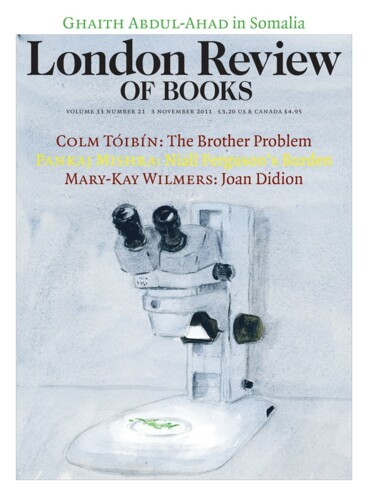Deborah Friedell
Deborah Friedell is a contributing editor at the LRB.
His Friends Were Appalled: Dickens
Deborah Friedell, 5 January 2012
Only after Charles Dickens was dead did the people who thought they were closest to him realise how little they knew about him. His son Henry remembered once playing a memory game with him:
My father, after many turns, had successfully gone through the long string of words, and finished up with his own contribution, ‘Warren’s Blacking, 30 Strand.’ He gave this with an odd...
At the National Portrait Gallery: ‘The First Actresses’
Deborah Friedell, 3 November 2011
The Protectorate was over, the Commonwealth had failed. Charles II entered London on 29 May 1660, his birthday, and began hanging judges and reopening theatres. Tongue firmly in cheek, a royal patent lamented that ‘many plays formerly acted do contain several profane, obscene and scurrilous passages’: the solution was to have women’s parts henceforth played by women, as...
On Saturday I sat the ‘Life in the UK’ test, a requirement for foreign nationals who want to apply for citizenship or permanent leave to remain. My nearest test centre was in a dingy basement off the Essex Road. The fluorescent lights weren't doing very well. The invigilators were stone-faced, a bit rude. I'd been forbidden from talking to or looking at my fellow immigrants, about 20 people, mostly men. While waiting for the test to begin all I had to look at was the cover of my American passport.
Georgette Heyer's advice for novelists, from Jennifer Kloester's forthcoming biography: 1. Induce your publisher to hand over at once a sum of money grossly in excess of what the book is likely to be worth to him. This gives one a certain amount of incentive to write the thing, and may be achieved by various methods, the most highly recommended being what may be termed as The Little Woman Act. 2. Think out a snappy title. This deceives the publisher into thinking (a) that he is getting the Book of the Year; and (b) that you have the whole plot already mapped out. The only drawback lies in the fact that having announced a title you will be slightly handicapped when it comes to hanging some kind of story on to it.
Podcasts & Videos
The Woman Who Interviewed Hitler
Deborah Friedell and Thomas Jones
In 1939, Dorothy Thompson was on the cover of Time, the ‘First Lady of American journalism’ and a major celebrity. By 1945, she’d been widely dismissed as a crank.Deborah Friedell joins Tom to discuss...
On Roe v. Wade
Laura Beers, Deborah Friedell and Thomas Jones
Laura Beers and Deborah Friedell talk to Tom about the recent decision by the US Supreme Court in Dobbs v. Jackson, which removed the constitutional right to abortion.
Ethel and Julius
Deborah Friedell and Thomas Jones
Deborah Friedell talks to Thomas Jones about the Rosenbergs, from their early years on the Lower East Side of New York to their execution for conspiracy to commit espionage in 1953, and the significance...
400 Million Guns
Deborah Friedell and Thomas Jones
Deborah Friedell talks to Thomas Jones about the origins, and origin myths, of the National Rifle Association, how it spends its money, and why it's wary of winning.
Read anywhere with the London Review of Books app, available now from the App Store for Apple devices, Google Play for Android devices and Amazon for your Kindle Fire.
Sign up to our newsletter
For highlights from the latest issue, our archive and the blog, as well as news, events and exclusive promotions.



